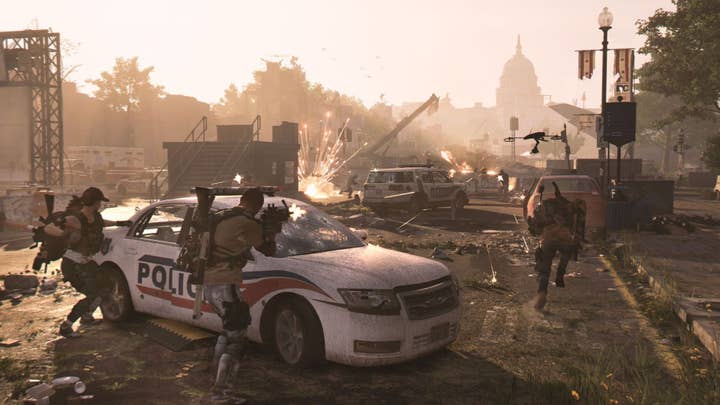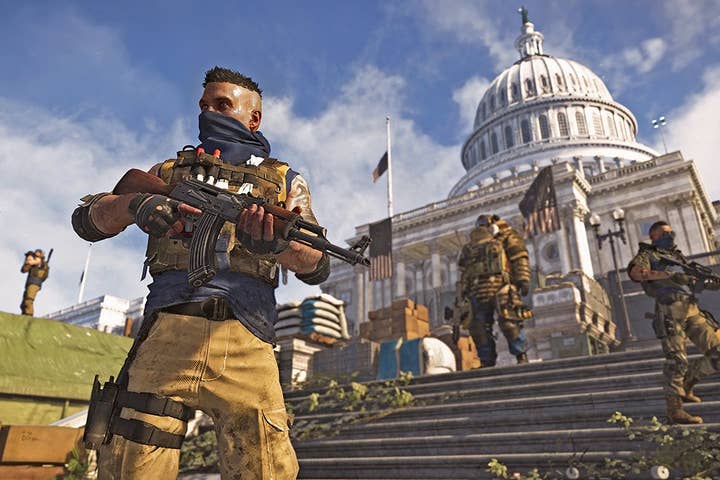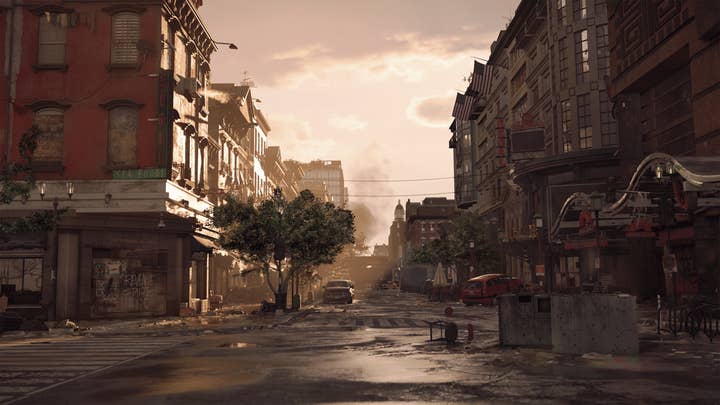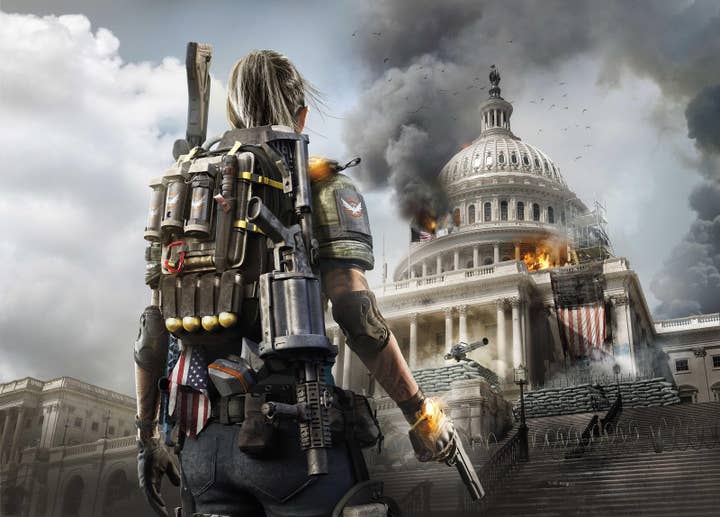Critical Consensus: Tom Clancy's The Division 2
Critics lament the lack of political heft in its story, but The Division 2 gets much right that BioWare's Anthem got wrong
The critical appraisal of Tom Clancy's The Division 2 is notable for being considerably better than that which greeted The Division in 2016. It is also notable for the sheer number of times that Anthem is mentioned -- and the comparisons do little to flatter EA BioWare's troubled release.
Of course, as online third-person shooters with a focus on loot the two games have much in common, but the resonant message from critics is that they are polar examples of how these huge, ambitious projects can turn out; Anthem got it wrong, The Division 2 got it right.
The Daily Telegraph, for example, opened its positive review with a tribute to "just how thoroughly competent" the game is at launch.
"If that immediately sounds like damning Ubisoft's militaristic looter-shooter with faint praise, that isn't the intention," reviewer Tom Hoggins said. "Launching a persistent online game in the vein of Destiny et al and having it hold together is bloody hard. Just ask Anthem.
"Launching a persistent online game and having it hold together is bloody hard. Just ask Anthem"
Tom Hoggins, The Telegraph
"Maybe it is just the disappointment at BioWare's sci-fi scramble of incessant loading screens, connection issues and disparate adventuring talking, but I half expected to go into Ubisoft's game facing a clutch of the same issues. But that hasn't happened; I fired up The Division 2, crafted my macho bearded soldier man and sent him into the post-apocalyptic capital to shoot bad guys and find sweet new knee-pads.
"And several hours later, I'm still enjoying a compelling, mechanically satisfying -- if aesthetically uninspiring -- shooter. And that's with very few technical hiccups, aside from the odd floating corpse and texture pop-in."
The emergence of games-as-a-service (GaaS) forced critics to answer some difficult questions. After a few decades of competing to be the first to reveal which number on a five-star, ten-point or percentage scale they had bestowed upon each new release, reviewers were faced with a new breed of products that defied absolute opinion, growing and shifting and changing over time; they could start poorly and find stability, or start confidently and become great.
Adapting their methods to accommodate the growing popularity of GaaS is perhaps the single biggest reason why so much of the press has reluctantly ended the love affair with scores and stars. It feels good to be an authority, but many games now take months and even years to reach what can be considered a final state. By most accounts, however, The Division 2 is taking its first-step on what could be a very long journey with a rare degree of polish and technical solidity.

This was pointed out by PC Gamer, which also drew a comparison to Anthem. After 25 hours "wrestling" with BioWare's game, PC Gamer's Samuel Roberts expressed gratitude for the myriad ways in which The Division 2 is a more considered and streamlined user experience. It also displays a knack for drama and set-pieces that is so often absent from games that must find ways to keep players engaged for hundreds of hours.
"Each main campaign mission feels like a real event," Roberts said. "Given that no one really makes linear third-person shooter games now -- here they're isolated parts of a massive open world looter game -- it's easy to forget what these kind of levels feel like when they're designed well.
"Each main campaign mission feels like a real event... It's easy to forget what these kind of levels feel like when they're designed well"
Samuel Roberts, PC Gamer
"There's an amazing excursion into the American History Museum, where there's a (probably tasteless) firefight in the midst of a Vietnam recreation exhibit, complete with royalty-free version of The End by The Doors playing in the background. Then there's a gunfight in the Air & Space Museum's planetarium and Mars exhibits, which for a few minutes make you feel like you're playing a sci-fi shooter.
"The finale of the campaign, meanwhile, offers a long battle on the roof of the Capitol Building, which is a great location for a selfie with the game's photo mode once you're done. The choices of setting for the main missions give them a lot of flavour. The longer strongholds that bookend the campaign, with one for each of the three factions, offer the biggest and most exhilarating set pieces in the game."
As with all Ubisoft open-world games, The Division 2 is generously loaded with activities that fall at different points on the scale between essential and perfunctory. However, Rock Paper Shotgun noticed an attention to detail that prevents these myriad tasks from feeling too much like busywork. It is in the design of the game's major set-pieces, as PC Gamer pointed out, but also in the smaller corners of the world itself. The Division 2, RPS said, gives the usual Ubisoft formula, "a lick of humanity."

"This is... a world of detail and atmosphere," said reviewer Brendan Caldwell. "You leave behind dusty boot-prints as you walk, and can make out the sound of bullet casings hitting the floor as you fire. Axes are buried in doors, abandoned mid-scavenge. In the beta, I found a dead man behind a bar with his dog lying next to him, also dead.
"Best among this world of detail are the quarantine zones, where you'll find no bandits, but plenty of gloom and audio diaries. These buildings encased in yellow warn-o-plastic are islands of quiet post-disaster storytelling in a sea of shootiness. Nothing attacks you in these moody hallways, they're just places you can visit if you want to feel unsettled at the scale of humanity's ruination. They feel like an olive branch to singleplayer types who want to slow things down and explore.
"One of them is an old natural history museum, where the huge model of a mammoth looks over a disturbing amount of body bags. I wish more of [Washington] DC had the confidence to throw away the waist-high cover and let the player take in the horror of a capital city gone to shit. Because the atmosphere of these yellow ghost houses makes them some of the best scenes in the game."
"Best among this world of detail are the quarantine zones, where you'll find no bandits, but plenty of gloom and audio diaries"
Brendan Caldwell, Rock Paper Shotgun
The absence of "shootiness" in these areas will be welcomed by anyone who misses the linear third-person shooters mentioned by PC Gamer's Samuel Roberts. Nevertheless, the majority of critics have praised The Division 2's gunplay, and the combat intelligence displayed by both its enemy forces and its friendly factions -- Polygon among them, which noted that, "it's so easy to overlook the game's forgettable story when the moment-to-moment action is so damn good."
"There is no way to overpower my adversaries by stats or grinding alone," said reviewer Owen S. Good. "My two options, from level 3 to level 30, are either to git gud or get help. And getting help, from the AI or other humans, is where I find the heart of the game.
"NPCs are much more involved and effective than their Big Apple predecessors in the first Division game. I work with civilian settlements whose residents fight, with real guts, to retake city blocks and intersections. In one firefight I was holding on for dear life behind an algae-blooming fountain, waiting to see a sniper's flashlight so I knew where to aim, when two friendlies ran up and shot the bastard like a rabid dog.
"I made up an emergent narrative for them on the spot: Meet Tim and Kim! They, uh, are analysts for the Department of Health and Human Services, and have season tickets for DC United! But what was remarkable was that I was the one drawing fire while Tim and Kim made the final kill. Friendly characters will rush to your aid when you fire a flare to signal the start of a control point battle, and you can always join them in battle if you stumble upon them fighting off one of the game's enemy factions."
In fact, there is very little dissent around The Division 2. The games press is united on the many areas that Ubisoft Massive (the game's lead studio) has succeeded, and it also speaks with one voice on the principal aspect in which it fails. In each of the reviews mentioned here, the praise for shooting, looting, set dressing and set pieces is dragged by a big black mark against the game's story -- to the degree it can be said that The Division 2 has a story at all.

The Telegraph declared it "wafer-thin," Polygon called it "forgettable," and PC Gamer noted that The Division 2, "barely makes me pay attention to its story at all." Every single review surveyed in preparation for this article focused on Ubisoft's widely discussed attempts to distance itself from any perceived political statements in the game's post-catastrophe Washington DC setting. Few had a kind word to say about the validity of that stance, and fewer still were less kind than VG247.
While reviewer Kirk McKeand commended The Division 2 for, "getting the basics right," Ubisoft's obvious reluctance to engage with inherent parallels between the world it has created and the one in which we live arises throughout his otherwise positive review.
"Ubisoft made it clear that The Division 2 had nothing to say pre-launch. To its credit, it was totally right. It has nothing to say at all"
Kirk McKeand, VG247
"At one point, I shoot some men so I can create a fresh water source for an encampment of survivors. This is a world where people don't have access to water or crops, but everyone has exploding remote control cars. Priorities were pretty messed up when the apocalypse went down.
"Of course, everyone has the most important thing you need in a survival situation: a gun. 'Did you own a gun? Did your neighbour?' the intro asks, definitely not holding up a mirror to the very real gun ownership debate in the US."
McKeand continued: "Ubisoft made it clear that The Division 2 had nothing to say pre-launch. To its credit, it was totally right. It has nothing to say at all. It's a game about holding down a button and watching numbers pop out of a man, getting stronger by finding more loot, then doing it all again. There's nothing like the surge of accomplishment you feel from securing a high-end, tactical bumbag.
"If some of the frustrations can be ironed out, it could be the best of its genre. But for the love of god, please let your writers say something if you ever make another one."
Whether the head-on tackling of global politics is what The Division 2 lacks is at least open to debate. Game developers have (at best) a spotty track record in doing so, but it's easy to understand the frustration at Ubisoft having spent so much time and money creating this particular alternate reality, and ignoring its resonance with our present moment. This complaint is as common among The Division 2's reviews as any point of praise, but it's worth noting that not every critic lamented the absence of direct political commentary.
"Many other reviews will likely tackle the political half-heartedness of its story," said Rock Paper Shotgun's Brendan Caldwell. "But not me, not this week. Sometimes it's better to leave the incessant chatter of current affairs quarantined in our everyday lives.
"Suffice to say, I'm enjoying it more than its predecessor. It is chunky, it is moreish, and every time I come back to it in the evening it is like taking a big bite out of one of those mega Snickers you can only find in the cinema. All this praise might seem out of place moments after critiquing the game's toothless practice of political commentary by obfuscation. But honestly, don't worry about that.
"We humans are idiot creatures of contradiction, and we can thoroughly enjoy a rock solid shooter even as we recognise it as being vapid hogwash."









